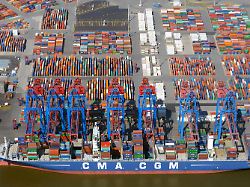“Take the issue very seriously”
What do attacks in the Red Sea mean for Europe’s economy?
January 19, 2024, 12:19 p.m
Listen to article
This audio version was artificially generated. More info | Send feedback
Attacks by Iran-backed Houthi militias in Yemen on ships in the Red Sea have disrupted shipping in the Suez Canal. Twelve percent of global container traffic is handled via it. It is the fastest route by sea between Asia and Europe. People are increasingly avoiding it and instead circumnavigating Africa, which takes significantly longer. The disruption comes at an inopportune time for the European economy, which is already teetering on the brink of recession. The most important questions and answers:
What consequences for Europe’s economy are already visible?
“The first warehouses are running empty, production disruptions in German companies are becoming visible,” warns the head of foreign trade at the German Chamber of Commerce and Industry (DIHK), Volker Treier. The Federal Ministry of Economics believes the consequences are still limited, but is watching the development with great concern. “There are isolated cases, but according to our observations there are no serious effects,” says a spokesman.
Due to the relocation of merchant ship routes, delivery times were extended. The effects on world trade are currently manageable. “We are continuing to monitor the situation very closely and are taking the issue very seriously,” he added. Bank of England chief Andrew Bailey agrees. The attacks “did not have the impact that I had feared,” says the central bank chief. However, uncertainty remains.
What do the economic barometers show?
The effects of the attacks have not yet become visible in the most important European economic indicators – from inflation to production. But that could change next week. Then the first results of the January survey of thousands of companies in Europe will be published, which will be summarized in the Purchasing Managers’ Index. ECB President Christine Lagarde could also address the issue in her press conference after the Frankfurt monetary authorities’ interest rate meeting next Thursday.
But why isn’t this having an impact on the economy yet?
The main reason is probably that the global economy is still sluggish. Europe and its largest economy, Germany, are even threatened with a recession. As a result, transport capacities are not being utilized to capacity, which still leaves a lot of scope. This is necessary because, due to the longer route, more ships are needed for the same cargo. Oil prices have not yet skyrocketed either. Global oil supply is solid, and demand has also slowed, says the head of the International Energy Agency, Fatih Birol. “I don’t expect a big change in oil prices because we have a large amount of oil on the market,” he emphasizes. The German logistics giant DHL also sees free air freight capacity in order to be able to switch more to air transport.
Are prices already rising?
The sea route from Asia to Europe is extended by around ten days by avoiding the Suez Canal and taking the route around the Cape of Good Hope. Freight rates for this route have already increased fourfold. Insurance premiums for ships that continue to sail through the Red Sea rose even more sharply. “However, there is hardly any threat of a new surge in inflation since transport costs only make up a very small part of product costs,” emphasize Commerzbank analysts Bernd Weidensteiner and Christoph Balz in an analysis. “Otherwise they wouldn’t move halfway around the world.”
How are companies reacting?
The weak economy and thus demand are making it more difficult for companies to pass on increased costs to consumers. “Our best forecast at the moment is that we will be able to absorb the additional costs and still achieve an improvement in gross margin,” says the CEO of the retailer Pepco, Andy Bond. Furniture giant Ikea even emphasizes that it will stick to its planned price cuts and has inventory levels to absorb any shocks in the supply chain.
Can governments in Europe ignore this?
No – because the longer the disruption lasts, the more likely it is to have an impact on the economy. Although not suddenly, but only gradually. “If the Red Sea is closed to shipping for several months and freight costs for shipping remain about twice as high as in mid-December, this could lead to an increase in annual inflation rates of 0.7 percentage points by the end of 2024,” analysts expect Oxford Economics. But that may not be enough to prevent global inflation from falling later this year. This should not stop important central banks from starting to cut interest rates around the middle of the year.
